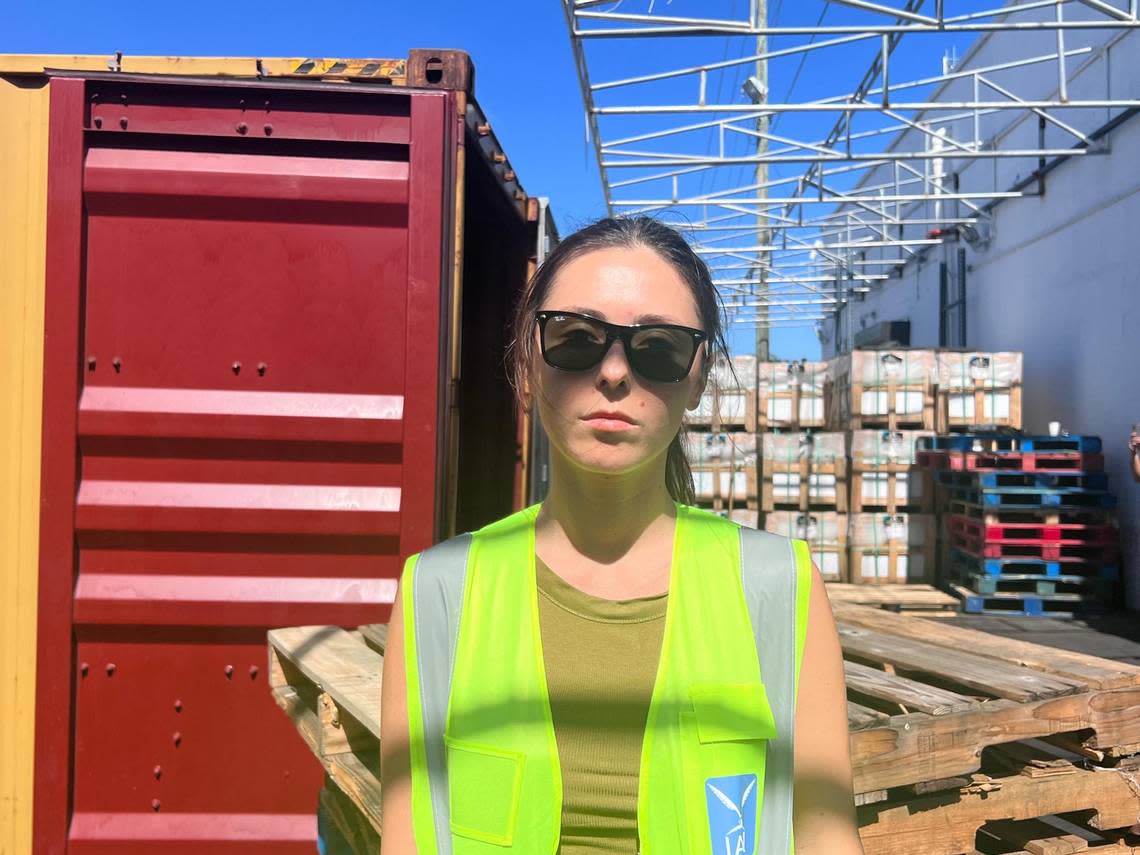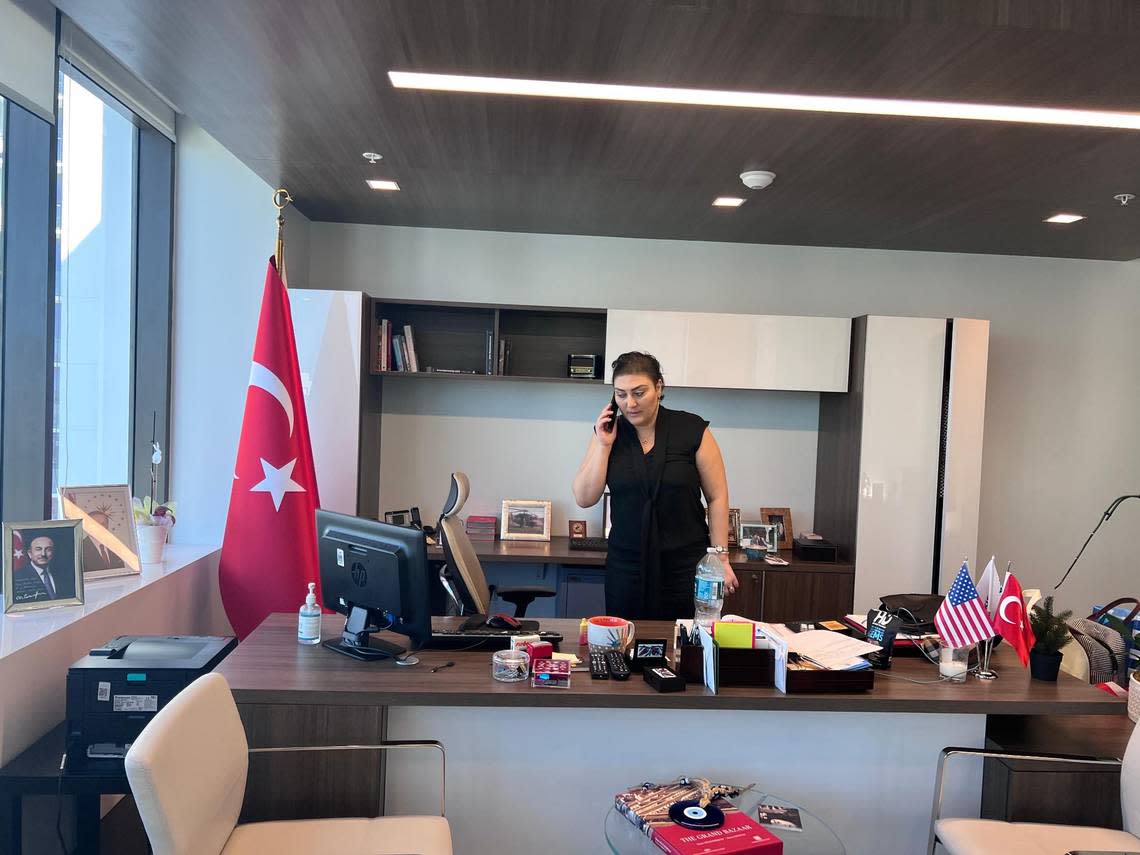‘All of them gone’: A Miamian feels dread, helplessness amid reports on relatives in Turkey
At a table outside a Brickell Starbucks, Oğuzhan Gönüllü, 32, recalled his childhood playing with his cousins in the now-destroyed home of his uncle and aunt along the Mediterranean coast in Turkey. Since the earthquake hit overnight on Feb. 6, he has struggled to sleep, drink, eat or think of anything else except his homeland. While he spoke, he barely sipped his coffee.
Three of Gönüllü’s family members are known dead. Six others, four of them children, are still unaccounted for under shattered buildings in the city of Antakya, in the southern province of Hatay, he said. The chances of them being found alive are slim, he and relatives who did survive now fear. But still, Sunday morning, other family members were planning to go to Antakya to see if it was possible to assist in rescuing any of their loved ones, some of whom were believed to be 65 feet deep within the ruins of two 18-story luxury apartment buildings that collapsed into each other.
“All of them gone,” Gönüllü said in a moment of despair. That is not a certainty but that is certainly his fear.
Much of Gönüllü’s family from his father’s side lived in Antakya, in the heart of the area devastated by the earthquake.
The current death toll in Turkey has surpassed 37,000, according to Reuters.
READ MORE: Amid staggering blow of earthquake, here is how South Floridians can help
Amid the death and chaos, acrimony and finger-pointing has occurred, with some residents expressing anger over how easily buildings collapsed and questioning construction practices. One owner of a luxury residential complex with hundreds trapped underneath was caught by Turkish police at the Istanbul airport, reportedly while fleeing to Montenegro.
Gönüllü has several sets of aunts, uncles and cousins divided among various households and buildings in the quake zone. The known dead and the missing would have been sleeping when the earthquake hit. Another 23 family members made it safely to nearby Ankara, where they are hunkered down in one house that has food, water and electricity.
With their homeland in such desperate need, South Floridians from Turkey are responding resolutely. They include a restaurateur who owns multiple Turkish restaurants, a Turkish business executive of a marine services company, and Turkish-born Miami residents who work for global logistics companies.
One man drove from Atlanta to Miami, a 13-hour trek, to deliver goods for an aid shipment.
“This is the most devastating catastrophe the country has ever experienced,” said Harun Duzgoren, the marine services business leader whose company, Subsea Global Solutions, has agreed to help receive, store, segregate and manage packages en route to Turkey.
Although South Florida is not known as a center of Turkish culture — estimates say something over 5,000 from Turkey live here, although some say that’s an underestimate — it is home to a consulate, one of six in the country. A consulate helps people with visa applications and other services. The area has a sprinkling of Turkish restaurants, is a point of arrival and departure for Turkish Airlines and in the wake of the disaster has become a transshipment hub for tons of aid to the stricken region.
Gönüllü, 32, lives here but was shaped by his upbringing in Istanbul, and spending three summer months each year in Hatay, which bore the brunt of the worst earthquake in Turkey this century, measured at 7.8 magnitude but with powerful aftershocks. The damage spilled over into Syria.
In his mind’s eye, he recalls pleasant memories of playing soccer with his cousins and sleeping on the roof of their home. He would also eat ‘Katıklı ekmek,’ a peppery flatbread with cheese traditional to Antakya, a region known for its cuisine. His aunt Adil, would bake the bread in a brick oven in the backyard of his family’s beach townhouse.
Adil also raised chickens and grew all sorts of greens, including parsley and onions that she would use in her cooking. Coming from Turkey’s largest city, this was very exciting and different for Gönüllü.
As a child he regarded his funny and caring uncle, Hatice, as the wealthy Santa figure of their family, always giving gifts to his nephews and nieces. Now, he understands his uncle was not wealthy, but rather a hardworking man who slowly used his money from working in a bank to build additional floors onto his home for his family to live in — a construction process that took years.
Both Adil and Hatice died in the disaster. So did a cousin from another branch of the family tree, a 23-year-old named Kubra. She owned a hair salon and lived with her mother and father. Kubra’s mother survived but has broken arms and legs and is now in a government medical facility with her husband, Kubra’s father, who also survived but with neck injuries. The mother is not yet cognizant of the reality that her daughter has died.

Gönüllü is still awaiting word on the six unaccounted for, including the four children.
Steeped in history
Antakya, Hatay’s capital, was built atop layers of ancient civilizations and was founded by a former general for Alexander the Great. Known for its mix of mosques, synagogues and churches, it was for a time the Roman Empire’s third-largest city. Over the centuries, it has been rebuilt several times.
Gokhan Yuzbasiolglu, the owner of El Turko, a Turkish restaurant located in Miami, says aside from its food, Hatay province is also known for being full of generous people who love to host and offer food to their guests, more often than not at dining tables with 15 or 20 people. Yuzbasiolglu was planning to travel to Hatay next month for culinary inspiration for his Turkish food.
He looks forward to seeing Hatay alive and back on its feet again.
Gönüllü works from his home in Hallandale Beach, where he lives with his wife, his stepson and their 15-month-old son Teoman. He is employed by a PR firm that represents digital magazines.
He was on the job when he heard the news, and immediately tried contacting his cousin Tuba over Instagram. The phone appeared to keep ringing, but there was no answer. He tried again and again. But he had no luck.
Immediately after the earthquake, when everyone was trying to call each other, calls were not going through.

The next day, he was able to get on a group conference call with most of the known surviving family members. He pleaded to them to let him come to Turkey to help, but they told him that would not be a good idea.
Like many people who are impacted by a natural disaster but not physically present, he is obsessed with checking Twitter and chatting with family in the region to find out what is going on.
What he learned was that as the earthquake pulverized the home of Adil, and Hatice, their five children and three grandchildren ran to the roof to escape. Hatice, the Santa-like gift giver, since aged into his 70s, couldn’t walk. Adil could, but not fast enough to get out of the building on her own.
After the children made it to the roof, they went back for their mom, carrying her out of the building. There were no ambulances, so they got in their car and drove her to the hospital, but found the hospital had been destroyed. Their mother died in their car.
Another six of Gönüllü’s family members lived in a different building nearby. All are still missing. Ayça, 17, Arda, 15, and 6-year-old twins Çağrı and Çağan are believed to be under the rubble of their destroyed apartment building along with Tuba, who is their mother and Gönüllü’s aunt, and her husband, Huseyin, who worked at a car dealership.
“We still cannot know if bad news or good news is coming regarding the four children and their parents,” Gönüllü said
Tuba owns a jewelry shop in the town. She and Gönüllü were very close and would speak on the phone frequently since he has been in Florida — catching up on family life and joking with each other.
“Maybe they find her under the construction,” Gönüllü said amid a fleeting flicker of hope on Friday afternoon. But “every hour it is late.”
Outside the apartment building in Hatay, a vacation town that Gönüllü says usually has a similar climate to Miami, government workers continue to dig, hoping for miracles.
Sometimes miracles occur. On Friday a 78-year-old who lived in the same building as Tuba, her husband and their four children was pulled out from the rubble alive. But with each passing day, hope fades.
